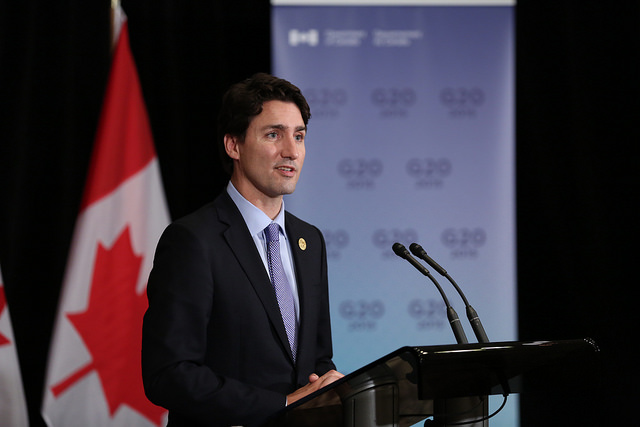Like this article? rabble is reader-supported journalism. Chip in to keep stories like these coming.
Canada is on the threshold of change, showing clear intentions of becoming an international human rights leader. But are we ready to walk through the door?
Prime Minister Justin Trudeau took a first step by meeting with the United Nations Secretary General and announcing Canada’s intention to build a “robust” relationship with the UN. The Honourable Ministers Dion and Bibeau echoed this sentiment by reaffirming a commitment to rights and dignity for all people in Canada on the rarely celebrated World Day for Social Justice.
While we seem to be taking a step forward Canada still has one foot firmly planted out the door. Prime Minister Trudeau’s government, like governments before it, has so far been somewhat intransigent about protecting human rights at home. The UN has taken note, and this week the Committee on Economic, Social and Cultural Rights issued its assessment of Canada’s performance over the last 10 years with respect to our human rights commitments for the most vulnerable.
For those who have watched our country perform in a kind of humdrum way with respect to the implementation of human rights within our borders over the last decade, it will come as no surprise that the UN wasn’t particularly impressed. In the past few decades, it’s become clear that Canada’s social safety net is tattered and can act more like a poverty trap than a supportive boost.
The committee — made up of 18 independent human rights experts from every region of the world — noted that a country as rich as Canada, that has effectively skirted the global economic crisis, is nowhere near meeting the standard that applies to us in light of our wealth. Considering Canada’s vast resources, we just can’t get away with allowing (and at times fostering!) poverty, homelessness, food insecurity, and systemic discrimination against Indigenous peoples, women, undocumented migrants, African Canadians, people with disabilities and others, to flourish.
Of course, this isn’t the first time the UN has said such things about Canada. Similar reviews with similar results were conducted in 1993, 1998 and 2006.
But what makes this review different is that beyond a new outlook on rights (what one Committee member called a “new” Canada), the UN implied that Canada has failed with respect to our approach to rights through governance. In particular, our seeming reluctance to embrace the idea that human rights are the backbone of governance.
Essentially, Canada must govern from a place where we understand that nearly every policy decision must be considered in light of our human rights obligations. In other words, it’s just not good enough for Canada to create policy and hope that it meets our international human rights obligations.
The Committee wants Canada to do much more — they want Canada to fully commit to rights and put both feet through the “rights” door. International human rights are the standard upon which policy must be based and against which outcomes must be measured. Without understanding a human rights method of governing, enacting and implementing policy, Canada will never be a real human rights leader. And we won’t be accepted as a leader if we don’t practice what we are trying to preach outside our borders.
The UN Committee provided examples across the board where the ambit of human rights must reach. With respect to Charter interpretation, the committee encouraged Canada to broaden the interpretation of the Charter to capture economic and social rights — and ensure homeless and poor people can access remedies when these rights are violated. To date, this has not been the case with government lawyers arguing that the Charter offers no protections for these groups.
With respect to financial matters, the committee reminded Canada that social spending decisions must be made for the progressive realization of Covenant rights.
And with respect to social policy, the Committee urged the government to make direct connections between its various strategies and programmatic initiatives and human rights. For example, if the government is going to adopt a national poverty reduction strategy, they have to base it in human rights, and they have to do the same for a national food policy, and a national housing strategy.
So what should Canada do in light of the UN’s overarching critique?
Canada can no longer keep one foot out the door, waffling on where and when rights matter. To borrow from a favourite children’s author, human rights matter “here, and there, and everywhere.” The UN has challenged Canada to walk through the door and commit to human rights as fundamental to every policy decision Canada makes.
Leilani Farha is the Executive Director of Canada Without Poverty (CWP). Michele Biss is CWP’s Legal Education and Outreach Coordinator.
Like this article? rabble is reader-supported journalism. Chip in to keep stories like these coming.
Image: Flickr/PMWebPhotos



